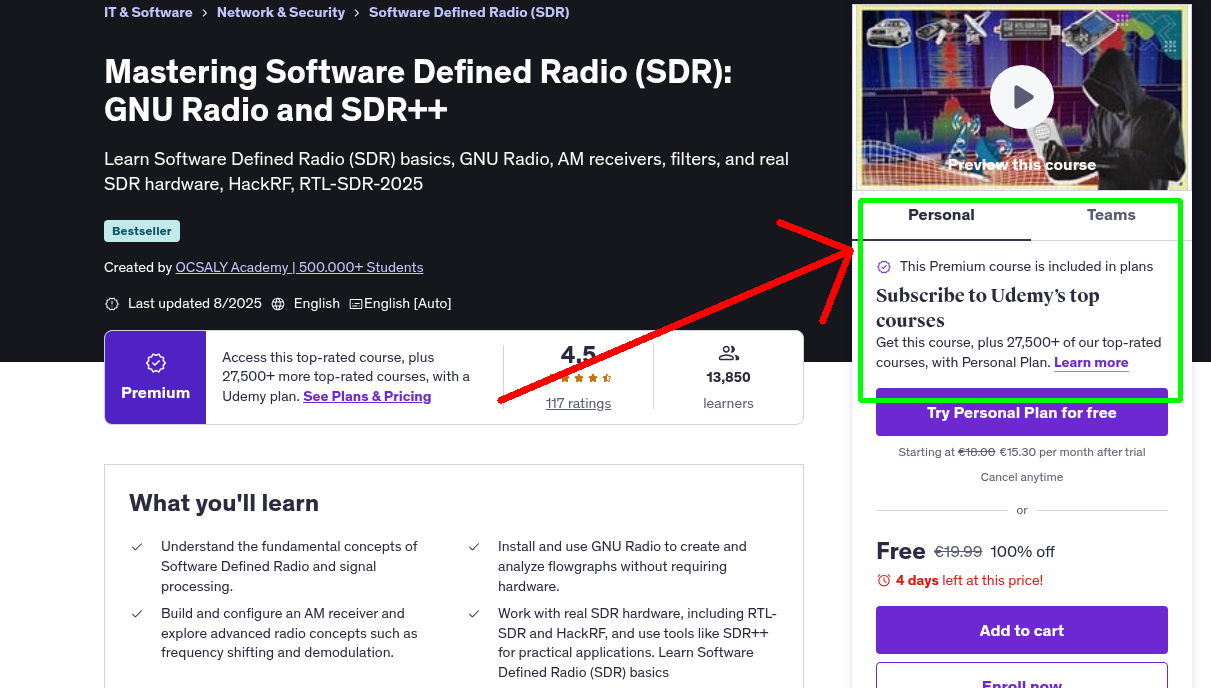
What You'll Learn
- Understand the fundamental concepts of Software Defined Radio and signal processing.
- Install and use GNU Radio to create and analyze flowgraphs without requiring hardware.
- Build and configure an AM receiver and explore advanced radio concepts such as frequency shifting and demodulation.
- Work with real SDR hardware, including RTL-SDR and HackRF, and use tools like SDR++ for practical applications. Learn Software Defined Radio (SDR) basics
- Fundamentals of Radio and Signal Theory: Grasp the basic concepts of radio waves and signal propagation.
- Modulation Techniques: Understand how information is encoded onto carrier waves using various modulation methods.
- Digital vs. Analog Signals: Differentiate between digital and analog signals and their respective applications.
- Installing GNU Radio: Learn to set up GNU Radio on Linux, Windows, or macOS platforms.
- GNU Radio Workspace Navigation: Become proficient in navigating the GNU Radio interface and utilizing its components.
- Working with Sources and Sinks: Understand the roles of sources and sinks in signal processing within GNU Radio.
- Designing Flowgraphs: Develop skills to create and manage flowgraphs for signal processing tasks.
- Manipulating Signal Properties: Learn to adjust signal properties and apply multipliers effectively.
- Building an AM Receiver: Construct and configure an Amplitude Modulation (AM) receiver using GNU Radio.
- Implementing QT GUI Elements: Add and configure QT graphical user interface components in your projects.
- Simulating Real Radio Signals: Use recorded file sources to emulate real-world radio signals for testing and analysis.
- Frequency Analysis: Create and interpret frequency spectra for various signals.
- Exploring Sinusoidal Frequencies: Examine the characteristics and applications of sinusoidal waveforms.
- Applying Fast Fourier Transform (FFT): Utilize FFT for signal analysis and understand its practical applications.
- Combining Complex Signals: Learn techniques for merging complex signals in signal processing tasks.
- Processing Real-World Audio: Work with actual audio signals to apply processing techniques.
- Understanding Signal Gain: Comprehend how gain affects audio and radio signals and how to control it.
- Decibel Theory: Understand the decibel scale and its relevance in signal processing.
- Introduction to Filters: Learn about different types of filters and their applications in signal processing.
- Designing Equalizers: Create equalizers and observe the effects of varying sample rates on sound quality.
- Advanced AM Receiver Concepts: Delve deeper into the workings of AM receivers and essential radio concepts.
- Radio Tuning Theory: Understand the theoretical aspects of tuning radios to specific frequencies.
- Frequency Shifting Techniques: Learn how frequency shifting is implemented and its significance.
- Signal Processing in Computers: Discover how computers interpret and process radio signals.
- RF Tuning Implementation: Develop and understand radio frequency tuning within SDR systems.
- AM Demodulation: Master the process of demodulating AM signals to retrieve transmitted information.
- Decimation in Signal Processing: Understand decimation and its role in reducing sample rates.
- Utilizing the Throttle Block: Learn the purpose of the throttle block in GNU Radio and its practical applications.
- Introduction to RTL-SDR: Explore the RTL-SDR hardware and its capabilities in SDR applications.
- Comparing SDR Hardware: Evaluate different SDR hardware options, such as HackRF and RTL-SDR models, to make informed choices.
Requirements
- Basic Understanding of how Computers Works
- (Optional) SDR Device like RTL-SDR or HackRF
Who This Course is For
- Beginners and enthusiasts looking to explore the world of Software Defined Radio without requiring hardware.
- Students, hobbyists, and professionals in telecommunications, electronics, and radio communication fields.
- Engineers and developers seeking hands-on experience with GNU Radio and SDR hardware.
- Anyone curious about how wireless communication works and wanting to develop practical SDR skills.
Your Instructor
OCSALY Academy | 550.000+ Students
Join 550,000+ happy students from 165 countries and beyond !
4.2 Instructor Rating
15,585 Reviews
558,742 Students
30 Courses
Never Miss a Coupon!
Subscribe to our newsletter to get daily updates on the latest free courses.



